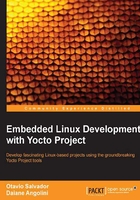
Configuring a host system
The process needed to set up our host system depends on the distribution we run on it. Poky has a set of supported Linux distributions, and if we are new to embedded Linux development, it is advisable to use one of the supported Linux distributions to avoid wasting time debugging build issues related to the host system support. Currently, the supported distributions are the following:
- Ubuntu 12.04 (LTS)
- Ubuntu 13.10
- Ubuntu 14.04 (LTS)
- Fedora release 19 (Schrödinger's Cat)
- Fedora release 20 (Heisenbug)
- CentOS release 6.4
- CentOS release 6.5
- Debian GNU/Linux 7.x (Wheezy)
- openSUSE 12.2
- openSUSE 12.3
- openSUSE 13.1
If our preferred distribution is not in the preceding list, it doesn't mean it is not possible to use Poky on it. However, it is unknown whether it will work, and we may get unexpected results.
The packages that need to be installed into the host system vary from one distribution to another. Throughout this book, you find instructions for Debian and Fedora, our preferred distributions. You can find the instructions for all supported distributions in the Yocto Project Reference Manual.
Installing Poky on Debian
To install the needed packages for a headless host system, run the following command:
$: sudo apt-get install gawk wget git-core diffstat unzip texinfo build-essential chrpath
If our host system has graphics support, run the following command:
$: sudo apt-get install libsdl1.2-dev xterm
The preceding commands are also compatible with the Ubuntu distributions.
Installing Poky on Fedora
To install the needed packages for a headless host system, run the following command:
$: sudo yum install gawk make wget tar bzip2 gzip python unzip perl patch diffutils diffstat git cpp gcc gcc-c++ eglibc-devel texinfo chrpath ccache
If our host system has graphics support, run the following command:
$: sudo yum install SDL-devel xterm